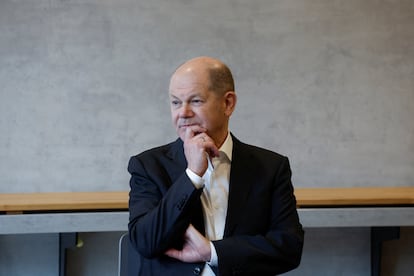Scholz’s refusal to send Taurus missiles to Ukraine divides German government
The Chancellor argues that the delivery of this long-range weaponry heightens the risk of Germany being dragged into the war


For months, Germany has been engaged in a debate about where to draw the line on aid to Ukraine, fearing that the delivery of weapons could ultimately spark open warfare with Russia. Despite both internal and external pressures, Chancellor Olaf Scholz is standing firm for now on his refusal to send Taurus missiles to prevent what he believes could draw Germany into the conflict. “I am surprised that this doesn’t move some people, that they don’t even think about whether, as it were, a participation in the war could emerge from what we do,” said the German head of government on Tuesday regarding a decision he had made back in October, but which he had never publicly clarified until now.
The Chancellor’s comments once again drew criticism from within his coalition government formed by the Social Democratic Party (SPD), the Greens and the Free Democratic Party (FDP). Agnieszka Brugger, vice-chairwoman of the Greens’ parliamentary group, pointed out that she and her party had been opposed from the outset to the exclusion of certain weapons systems in the context of support for Ukraine. The Greens’ defense expert told the Deutschlandfunk radio station that it was entirely possible to supply Kyiv with Taurus missiles without the involvement of German soldiers. “We must do everything possible to prevent a Russian victory, also in the interest of Germany’s own security,” she explained.
Scholz discussed the Taurus missiles after returning from Paris, where a meeting was held Monday with leaders and ministers of the European Union, as well as representatives of the United Kingdom, Canada and the United States. While all countries present at the meeting concurred that Ukraine needs “substantial support” in terms of armaments, there is one red line that the German Chancellor is not yet willing to cross. This is the sending of the powerful long-range missiles, precision-guided weapons that can reach targets 500 kilometers away. Moscow is situated within this radius from the Russian-Ukrainian border. The Ukrainian government requested the delivery of these missiles in May last year so that it could attack Russian infrastructure away from the front line.
For the first time, the Social Democrat politician openly explained why he has not yet granted his approval. “We must not be linked at any time and in any place to the targets pursued by these missiles,” he told a conference organized by the German news agency DPA. Scholz said the risk of Germany being drawn into the war is “too big” and pointed out that Ukraine’s current needs are primarily for ammunition. “This clarity is necessary.”
The dispute over the supply of Taurus cruise missiles has been rumbling in the coalition government for months. Not even the fact that Germany has become Ukraine’s second major arms supplier, behind the United States, and has supplied Leopard tanks ― also controversial at the time ― and all kinds of equipment and weapons like air defense systems would seem to have changed Scholz’s opinion concerning one of the Air Force’s most modern missiles.
The Bundestag vice-president, Katrin Göring-Eckardt, of the Greens also voiced criticism of Scholz. “No one calling for Taurus (missiles) for Ukraine wants Germany to become part of the war,” she said. “However, for peace in Europe and beyond, it is essential for Ukraine to prevail in this defense battle,” pointed out the politician, who recalled that the gravest danger for Ukraine and for Germany is still that Russian president, Vladimir Putin, continues to have the upper hand and to pursue “his imperialist campaign.”
Meanwhile, liberal politician Marie-Agnes Strack-Zimmermann, chairwoman of the Bundestag Defense Committee, told the Welt TV channel that she was “astounded” and rejected that German soldiers would have to go to Ukraine to ready these missiles, as Scholz claims. “The federal chancellor’s assertion is false,” she stressed and explained that Ukrainian soldiers can learn how to operate them in Germany. Strack-Zimmermann also dismissed fears that Taurus missiles could be reprogrammed by the Ukrainians to attack targets in Russia that Germany would not approve of. This would mean that Germany could be drawn into the war and she recalled that there are already numerous German-produced programmed weapons in Ukraine.
Criticism from the opposition
Criticism poured in from the opposition as well. “The claim that the surrender of Taurus (missiles) would make Germany a party to the war is simply untrue from a legal perspective and infamous from a political point of view,” wrote Christian Democratic Union (CDU) foreign policy expert Norbert Röttgen on the social network X. “The Taurus is not a miracle weapon, but it is strategically important because it allows the Ukrainians to destroy positions in the occupied territories without advancing to the front line themselves. The Taurus would therefore protect both soldiers and civilians.”
The conservatives are demanding the delivery of the Taurus missiles and Scholz’s coalition allies are also mostly in favor. However, a resolution in the Bundestag (lower house of parliament) requesting the handing over of these missiles was rejected last week. Scholz has repeatedly insisted that the criteria for the supply of weapons always involves close coordination with the U.S., which also does not supply this missile system, unlike France and the U.K.
Currently, Scholz can count on the support of the Germans. According to the latest RTL and ntv poll, 56% of Germans believe his decision to be “correct” and feel that Germany should not provide Ukraine with these weapons. In contrast, 35% of those surveyed are in favor of the provision. For Scholz, it is important for there to be a debate on this issue in public opinion. “We have to hang on for a long time. In a democracy and in a country that supports freedom, this is only possible if the majority of citizens are convinced that this is the right thing to do.”
In addition, Scholz was also quick to close the door opened by French President Emmanuel Macron regarding a possible dispatch of Western troops to Ukraine. “There will be no ground troops, no soldiers on Ukrainian soil dispatched there by European countries or NATO states, and the soldiers who are active in our countries will not be taking an active part in the war.”
Sign up for our weekly newsletter to get more English-language news coverage from EL PAÍS USA Edition
Tu suscripción se está usando en otro dispositivo
¿Quieres añadir otro usuario a tu suscripción?
Si continúas leyendo en este dispositivo, no se podrá leer en el otro.
FlechaTu suscripción se está usando en otro dispositivo y solo puedes acceder a EL PAÍS desde un dispositivo a la vez.
Si quieres compartir tu cuenta, cambia tu suscripción a la modalidad Premium, así podrás añadir otro usuario. Cada uno accederá con su propia cuenta de email, lo que os permitirá personalizar vuestra experiencia en EL PAÍS.
¿Tienes una suscripción de empresa? Accede aquí para contratar más cuentas.
En el caso de no saber quién está usando tu cuenta, te recomendamos cambiar tu contraseña aquí.
Si decides continuar compartiendo tu cuenta, este mensaje se mostrará en tu dispositivo y en el de la otra persona que está usando tu cuenta de forma indefinida, afectando a tu experiencia de lectura. Puedes consultar aquí los términos y condiciones de la suscripción digital.








































